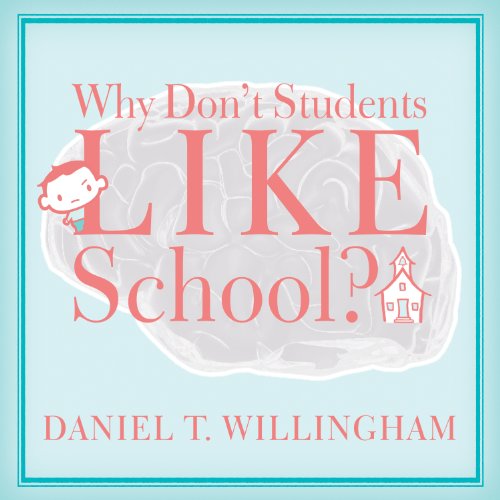
Why Don't Students Like School?
A Cognitive Scientist Answers Questions About How the Mind Works and What It Means for the Classroom
No se pudo agregar al carrito
Add to Cart failed.
Error al Agregar a Lista de Deseos.
Error al eliminar de la lista de deseos.
Error al añadir a tu biblioteca
Error al seguir el podcast
Error al dejar de seguir el podcast
 Exclusivo para miembros Prime: ¿Nuevo en Audible? Obtén 2 audiolibros gratis con tu prueba.
Exclusivo para miembros Prime: ¿Nuevo en Audible? Obtén 2 audiolibros gratis con tu prueba.Compra ahora por $17.33
-
Narrado por:
-
Paul Costanzo
Kids are naturally curious, but when it comes to school, it seems like their minds are turned off. Why is it that they can remember the smallest details from their favorite television programs, yet miss the most obvious questions on their history test? Cognitive scientist Dan Willingham has focused his acclaimed research on the biological and cognitive basis of learning and has a deep understanding of the daily challenges faced by classroom teachers. This book will help teachers improve their practice by explaining how they and their students think and learn - revealing the importance of story, emotion, memory, context, and routine in building knowledge and creating lasting learning experiences.
In this breakthrough book, Willingham has distilled his knowledge of cognitive science into a set of nine principles that are easy to understand and have clear applications for the classroom. Some examples of his surprising findings are:
- "Learning styles" don't exist. The processes by which different children think and learn are more similar than different.
- Intelligence is malleable. Intelligence contributes to school performance and children do differ, but intelligence can be increased through sustained hard work.
- You cannot develop "thinking skills" in the absence of facts. We encourage students to think critically, not just memorize facts. However, thinking skills depend on factual knowledge for their operation.
Why Don't Students Like School is a basic primer for every teacher who wants to know how their brains and their students' brains work and how that knowledge can help them hone their teaching skills.
Download the accompanying reference guide.©2009 Daniel T. Willingham (P)2011 TantorLos oyentes también disfrutaron:




















Reseñas de la Crítica
Las personas que vieron esto también vieron:




Read this one in print- not well suited to listening
Se ha producido un error. Vuelve a intentarlo dentro de unos minutos.
What made the experience of listening to Why Don't Students Like School? the most enjoyable?
Chock full of information I can use in my teaching/tutoring.What was one of the most memorable moments of Why Don't Students Like School??
Chapter 5 about the importance of practice.Was this a book you wanted to listen to all in one sitting?
No, but it is one I love to return to for rereading.Love this book, I refer to it often.
Se ha producido un error. Vuelve a intentarlo dentro de unos minutos.
Crammed with useful insights
Se ha producido un error. Vuelve a intentarlo dentro de unos minutos.
The only reason I gave this book a 4/5 is that it is a tiny bit repetitive. Obviously the author is trying put one of his principals of learning into practice. For the most part that works but in some places it feels like he is not providing new information but just rehashing the old. This only interfered mildly with my enjoyment of the material however.
Thanks!
Clear and grounded in science
Se ha producido un error. Vuelve a intentarlo dentro de unos minutos.
This is a great general interest and teaching guide
Se ha producido un error. Vuelve a intentarlo dentro de unos minutos.


